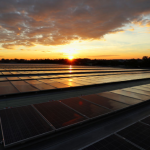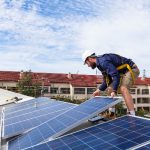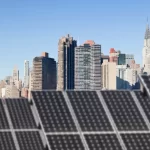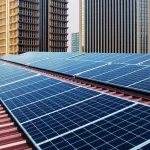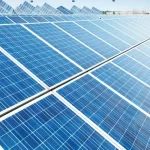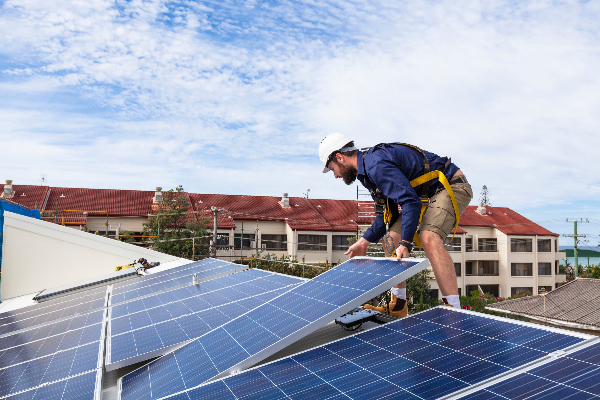
There are several steps a commercial Solar Power Company NJ takes to deliver sustainable energy. Over the past decade, the market for solar energy has been growing. One major contributing factor to this increasing demand is the solar farm. A solar farm or photovoltaic (PV) power station is typically a large decentralized solar panel array that supplies electricity to the power grid. Commercial solar project developers typically sell this energy to local utility companies. Then, businesses and residents can purchase the renewable energy as an alternative to a rooftop system. If you are interested in getting solar panels in NJ, read on to learn how a commercial Solar Power company NJ delivers sustainable energy.
Identify Suitable Site
To deliver sustainable energy, New Jersey commercial solar project development companies first must identify a suitable site for their installation. When evaluating local sites for their solar project, NJ engineers consider several factors to provide you with an efficient and reliable renewable power source. First, they examine the amount of land needed for their project. In addition, solar project developers in NJ also assess light obstructions on the site to ensure they can capture plentiful amounts of photons for viable electric power. Proximity to the utility grid is a major influential factor for solar developers. Developers also look at the soil composition and structure to ensure that it is safe for PV panel installation. To provide sustainable energy to NJ residents and businesses, commercial solar project development companies first must identify a suitable site.
Conduct Studies & Apply For Permits
Once commercial solar development companies have identified an optimal site, they need to conduct studies and apply for permits before they can provide high quality renewable power. This is a major step of installing solar for commercial buildings in NJ. Typically, these studies entail technical and geological evaluations. Solar engineers may take a visit out to the site to study how the electricity from the solar panels will travel to the electric grid for use. During this stage, project developers also need to apply for permits from local, state, and federal agencies. In New Jersey, the Division of Land Use Regulation may require authorization depending on the characteristics and impacts of proposed structures. Upon approval, project developers can move forward in the renewable power process. It is essential for NJ commercial solar project developers to conduct studies and apply for permits to safely deliver renewable energy for your electric use.
Design Grid Interconnection
After conducting studies and receiving permit approval, commercial solar project developers in NJ design grid interconnection. Proper interconnection to the electric grid is critical to a solar project’s success. Once a viable site has been chosen and approved, experienced solar engineers develop the necessary applications to deliver power to the target location. This step can often be one of the most difficult and costly aspects for project developers. Additionally, as solar farms expand, the grids may become more congested, leading to difficulties. To mitigate these issues, solar project engineers take caution and care when developing interconnection technology for optimal electric usage. They also examine optimal panel positioning for maximum energy capture during this step. It is imperative for New Jersey commercial solar project developers to design grid interconnection properly and efficiently to deliver sustainable power.
Calculate PV Panel Volume & Costs
In addition, NJ commercial solar project developers also calculate the PV panel volume and costs to provide reliable renewable energy for users. To determine the number of solar panels they will need for the array, engineers start by calculating the necessary amount of kWh energy. Then, they often utilize a calculation software to determine the solar panel production ratio for the given New Jersey region. During this stage, solar installers also calculate the cost for the installation. Depending on the location and size of the solar plant, cost per watt may vary. Luckily, solar project developers can apply for financing for their construction project. It is essential to calculate PV panel volume and costs before commercial solar project development companies NJ can build the plant and deliver sustainable energy.
Generate Power For Local Utility
Furthermore, after solar project developers have a skilled team construct their farm, they can generate power for the local utility. Essentially, the principles of power generation are similar to rooftop installations on a larger scale. Solar project developers utilize their large trace of land to generate and sell electricity to the local utility. Then, the local electric company pays the project developer for the power. Residential and commercial businesses can then purchase the renewable energy from their utility company. In this way, commercial solar project development companies deliver sustainable energy to their New Jersey communities.
There are several steps that a commercial companies take to install NJ commercial solar panels on advanced facilities. First, they must identify a suitable site for their solar farm. Then, solar plant developers conduct studies and apply for permits to ensure the land is safe, efficient, and reliable to supply renewable power. Next, solar engineers design grid interconnection technology for the panels to transfer their power to utility companies. In addition, solar project development companies must calculate PV panel volume and costs. Furthermore, once professionals have installed the solar plant, they can generate power for the local utility. Consider the points mentioned above to learn about how a commercial solar project development company NJ delivers sustainable energy.
